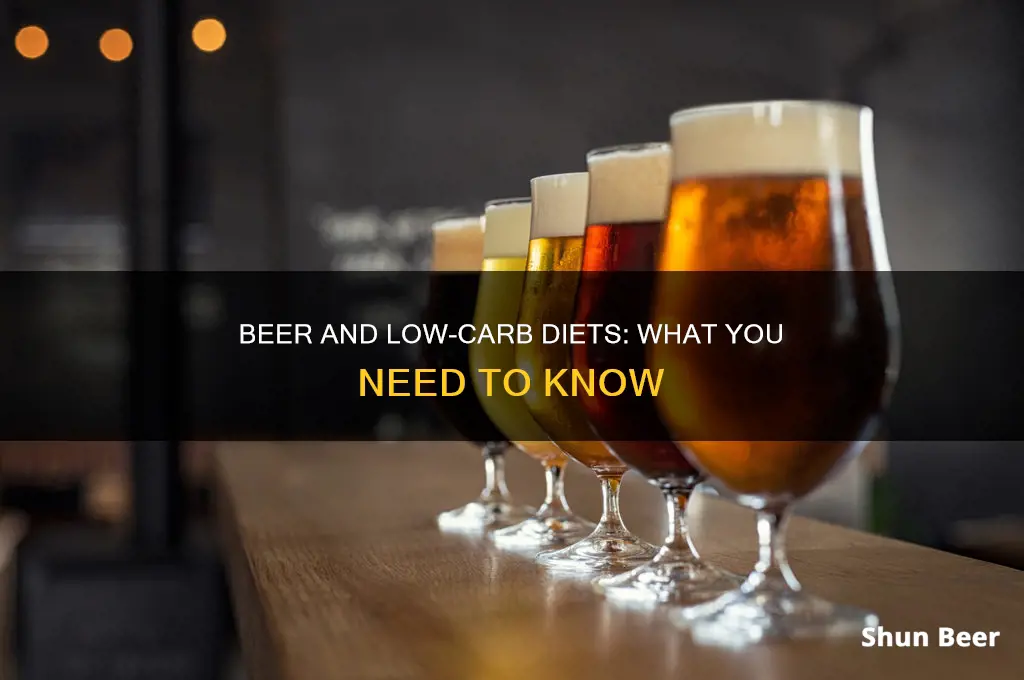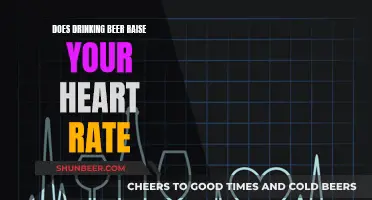
Beer is one of the highest-carb alcohol options, so it's not the best choice if you're on a low-carb diet. However, there are some lower-carb beers available, and drinking in moderation may not be a major issue as long as your drink is low in carbs and calories.
What You'll Learn

Beer is one of the highest-carb alcohol options
Starch is one of the primary ingredients in beer, and it is this that contributes to its high carb content. The amount of carbohydrates can vary depending on the type of beer, with light beers generally having lower carb counts. For example, a Budweiser Select 55 contains just 1.9 grams of carbs per 12-ounce serving, while a regular Budweiser has 11 grams.
Beer also tends to be high in calories, with a typical beer containing between 150 and 300 calories. This, combined with its high carb content, means that beer is not usually considered a good choice for those trying to lose weight or improve diabetes control.
However, it is important to note that not all beers are created equal when it comes to carb content. There are some lower-carb options available, such as light beers or keto-friendly beers, which typically have fewer than 5 grams of carbs per serving. These include Budweiser Select 55, Corona Premier, and Beck's Premier Light, to name a few.
While beer may not be the best choice for those on a strict low-carb diet, it is possible to include it in moderation, especially if you opt for lower-carb varieties.
Beer and Sinus Infections: Is It Safe to Drink?
You may want to see also

Pure spirits are low-carb
Pure spirits such as whiskey, gin, tequila, rum, and vodka are all completely free of carbs. This means that they can be consumed on a low-carb diet, as long as they are drunk in moderation and not mixed with sugary drinks or juices. For example, a vodka and orange juice contains 28 grams of carbs and 175 calories.
If you are on a low-carb diet, it is important to be aware of the carb content of your drinks. A standard 1.5-ounce jigger of pure spirit contains on average about 100 calories.
It is also worth noting that, when on a low-carb diet, you might feel the effects of alcohol more strongly. This is because your body prioritises metabolising alcohol over other nutrients. This means that you may need to drink less alcohol than usual to avoid becoming intoxicated.
How Much Is Too Much? Drinking 12 oz Beer
You may want to see also

Dry wines are low-carb
It is possible to drink alcohol while on a low-carb diet, but it is important to be mindful of the type of alcohol and the quantity consumed. Beer typically has a high carb content, with 3-12 grams of carbs per 12-ounce (355-ml) serving, depending on the variety. Light beers tend to have lower carb content, with some containing around 5 grams (g) of carbs or less per serving.
Wine, on the other hand, is a reasonably low-carb option compared to beer and cocktails. Dry wines, in particular, are low-carb beverages. Dry white wines, such as Chardonnay and Sauvignon Blanc, and dry red wines, such as Merlot and Cabernet Sauvignon, typically contain about 2-4 grams of carbs per glass. Sparkling wines like Brut Champagne, Prosecco, and Cava are also excellent choices, as they usually have minimal carbs.
When choosing a wine on a low-carb diet, it is best to opt for dry wines, as they have a minimal amount of residual sugar. Look for terms like "dry", "sec", "trocken", "brut", and "brut nature" on the label. Higher alcohol content wines also tend to have lower residual sugar, so choosing wines with an ABV of 13.5% or less is a good option.
It is important to remember that even though dry wines are low-carb, alcohol can hinder weight loss efforts as the body tends to burn alcohol before fat. Therefore, moderation is key. For women, it is recommended to have no more than one drink per day, and for men, no more than two drinks per day. Additionally, serving size matters, so sticking to standard 5-ounce or 148-milliliter servings can help keep the carb count in check.
Flu Shot and Beer: Is It Safe?
You may want to see also

Beer raises blood sugar levels
Beer and diabetes are not a good combination. If you have diabetes, drinking beer can cause your blood sugar levels to drop very low, a condition known as hypoglycemia.
Your liver is the organ that stores and releases glucose (sugar) into your bloodstream. It does this between meals and while you sleep to help maintain healthy blood sugar levels. The liver is also in charge of breaking down toxins so they can be flushed out of your body by your kidneys. When you drink alcohol, your liver has a difficult time doing both of these jobs at the same time. It ends up breaking down alcohol instead of releasing glucose regularly. When this happens, your blood sugar levels drop. This is even more likely to happen when you drink without eating any food.
Beer is also high in carbohydrates, which can raise blood sugar levels. Alcoholic drinks such as beer and sweetened mixed drinks are high in carbohydrates, which can raise blood sugar levels. Small amounts of beer and sweet wines can be high in carbohydrates, which can raise blood sugar temporarily.
The risk for low blood sugar remains for hours after you take your last drink. The more drinks you have at one time, the higher your risk. This is why you should only drink alcohol with food and drink only in moderation.
If you are on a low-carb diet, there are some beers that are considered low-carb. These include Busch Light, Blue Moon LightSky, Omission Ultimate Light Golden Ale, and Corona Premier. These beers generally have less than 1g of carbs per 100 milliliters.
Drinking Beer While on Naltrexone: What You Need to Know
You may want to see also

Beer can knock you out of ketosis
Beer typically has a high carb content, as starch is one of its primary ingredients. A standard beer contains 13 grams of carbs per serving, which is more than wine, which has 3-5 grams. However, there are some low-carb beers available that contain around 5 grams of carbs or less per serving. These include Budweiser Select 55, Corona Premier, Michelob Ultra Pure Gold, and Beck's Premier Light, among others.
When you're on a keto diet, your body uses fat for energy instead of carbs. In the absence of carbs, your liver turns fat into energy molecules called ketones. When you drink alcohol, your body prioritizes metabolizing the alcohol instead of producing ketones from fat. This slows down the fat-burning process and can potentially slow down your weight loss goals.
Additionally, alcohol is considered the fourth macronutrient, along with fat, carbs, and protein. It contains 7 calories per gram, so consuming too much on a regular basis could contribute to weight gain.
So, while you may be able to have an occasional beer while on a keto diet, especially if you choose a low-carb option, drinking too much or too often may knock you out of ketosis and hinder your weight loss efforts.
Beer and Milk: Mixing Drinks, Safe or Not?
You may want to see also
Frequently asked questions
Yes, you can drink beer while on a low-carb diet, but it is important to choose a low-carb beer and consume it in moderation.
Some low-carb beers include Bud Light, Budweiser Select 55, Corona Premier, Dogfish Head Slightly Mighty, and Lagunitas DayTime.
A typical beer contains around 13 grams of carbohydrates per 12 ounces (355 milliliters).
Yes, wine and pure spirits such as whiskey, vodka, gin, and tequila are lower in carbs than beer.
Alcohol may slow down weight loss on a low-carb diet as it is metabolized by the body before other energy sources, such as body fat. It also contains empty calories and can stimulate appetite, leading to increased food intake.







